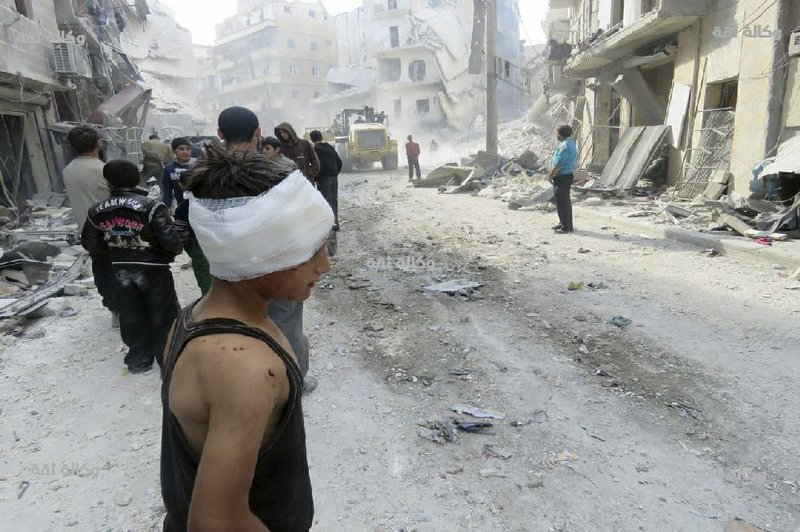BEIRUT -- Airstrikes hammered rebel-held zones Wednesday in Syria's besieged Aleppo, badly damaging a children's hospital as staff members and patients huddled in a basement, doctors said.
The attacks came a day after Syrian government forces and their Russian allies resumed offensives across northern Syria, including Russian cruise-missile strikes from a warship in the Mediterranean. Syrian forces, meanwhile, bombarded rebel-controlled eastern Aleppo in an attempt to break one of the opposition's last urban strongholds.
Russia said Tuesday that it had opened a major offensive against rebel-held areas in Idlib and Homs provinces, but denied involvement in the new attacks on Aleppo.
Once Syria's economic powerhouse, Aleppo has been divided between rebel and government control since 2012 along one of the most intractable front lines of the war. The United Nations estimates that pro-government forces have trapped some 275,000 people in Aleppo's eastern quarters in a strict blockade enforced since August, as ground and air forces meanwhile pound the area's hospitals.
Loss of the rebel footholds in Aleppo would be a major blow to armed factions and others fighting the government of Syrian President Bashar Assad. It also could hasten the fall of their remaining strongholds across the country.
Staff members at the children's hospital in Aleppo's al-Shaar neighborhood said they were hiding in the basement, counting the bombs above their heads. The young patients and their parents cowered alongside in one of the few hospitals still operating in rebel-held parts of Aleppo.
East Aleppo's central blood bank, near the hospital, also was hit in the raids, residents said. Activists said they counted about 50 artillery rounds and airstrikes since the morning hours.
Speaking from the basement of the children's hospital, its director, who identified himself only as Hatem, said his staff was trapped. "The planes are up above. We can't get out. Maybe we can protect ourselves in this room," said Hatem, who gave only one name in fear of possible reprisals against his family.
The Britain-based Syrian Observatory for Human Rights, a monitoring group, said at least 32 civilians have been killed since the bombardment resumed Tuesday after a nearly four-week respite. Residents said an ambulance driver was among the dead, underscoring the dangers facing rescue workers who venture out to save lives.
The civil-defense rescue group, known as the White Helmets, reported that 11 civilians were killed in the Sukkari neighborhood on Wednesday alone.
Video footage from the al-Shaar area appeared to show the aftermath of a fierce bombardment. Fires licked the edge of cars and buildings, and the air was filled with dust.
The Independent Doctors Association, a nonprofit group, said the children's hospital had been badly damaged. It was the fifth attack on a medical facility in three days. The United States condemned those attacks Tuesday, calling them violations of international humanitarian law.
Adham Sahloul of the Syrian American Medical Society, which supports several hospitals in opposition areas in Syria, said it appeared the government was focusing its fire on Aleppo's medical infrastructure. There are only five functioning trauma facilities left in eastern Aleppo, he said.
East Aleppo is surrounded by an array of government-allied forces, including Syrian troops and Iran-backed militias, and its supply routes have been cut. The U.N. said last week that aid workers in the area had handed out the last of their food stockpiles.
On Wednesday, a Syrian state-owned television channel, Ikhabariyah, reported large troop deployments along several main fronts in Aleppo. It claimed an assault was imminent and that "zero hour" would soon begin.
The Syrian and Russian governments have framed the fight against armed opposition groups as a war on terrorism. In an interview with Portuguese television that aired Tuesday, Assad suggested that President-elect Donald Trump could be a "natural ally" to the Damascus government if he is "genuine" about fighting "terrorists" in Syria.
Trump has indicated he would prioritize defeating the Islamic State group in Syria over regime change, saying the rebels could be "worse" than the sitting president.
But attacks repeatedly have targeted civilian infrastructure, often bombing areas where moderate rebel factions operate. Assad's troops also have besieged dozens of towns and villages, adopting a policy toward civilians that the United Nations has labeled "surrender or starve."
Although it began with peaceful protests, Syria's rebellion is increasingly dominated by jihadi factions, including an al-Qaida-linked group -- Jabhat Fatah al-Sham, formerly known as the Nusra Front -- that focuses on building a popular constituency among the communities it says it protects.
The Syrian Observatory for Human Rights said Wednesday that Russian airstrikes had resumed in Idlib, a province where Jabhat Fatah al-Sham operates among civilians and other rebel groups.
Sherif al-Khalaf, a journalist from the area, said the bombing had struck 34 areas since Tuesday, killing six and wounding dozens. "The damage is immense and people are frightened," he said.
Syria's five-year war has claimed the lives of an estimated half a million people and touched off the largest refugee crisis since World War II.
Information for this article was contributed by Louisa Loveluck and Heba Habib of The Washington Post and by Philip Issa of The Associated Press.
A Section on 11/17/2016

